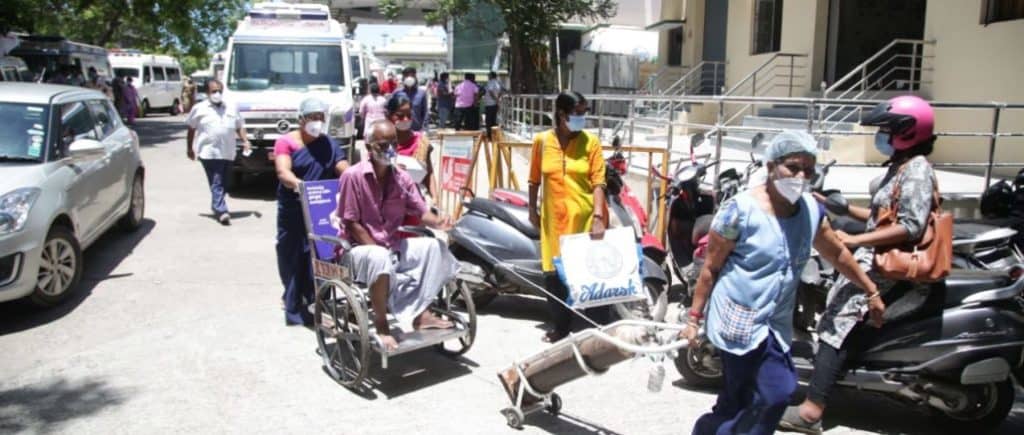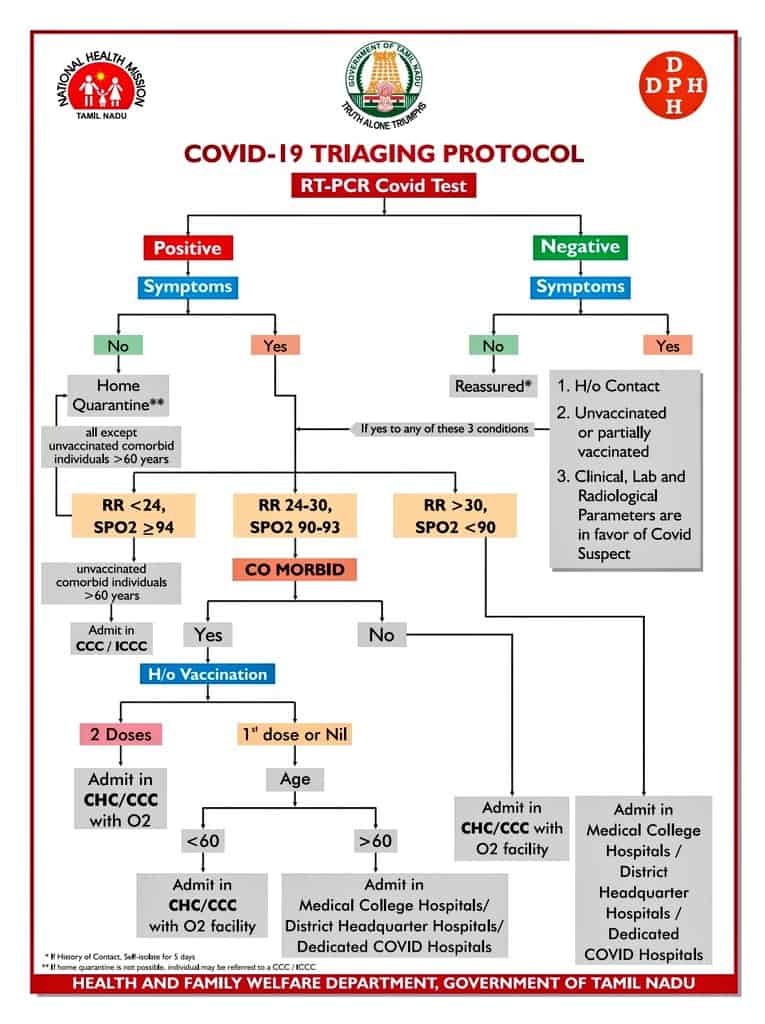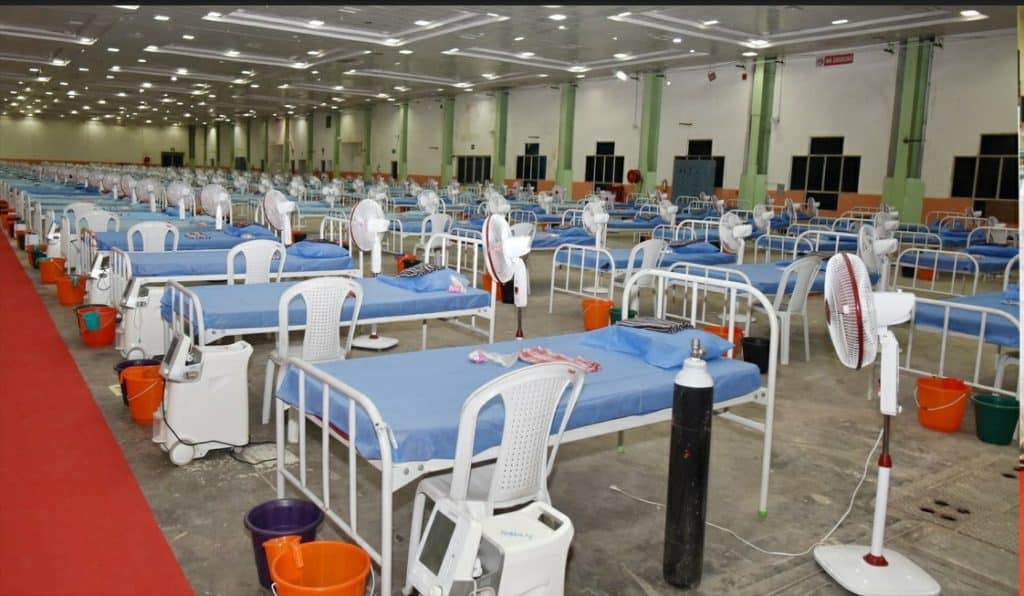On January 6th, the state of Tamil Nadu recorded a total of 6,983 new positive cases of COVID-19. Out of these, 3,759 cases, which is around 54%, were recorded in the state capital of Chennai, which has been contributing to the most number of COVID cases in the state, followed by the districts of Chengalpattu and Coimbatore. Expectedly, people are now questioning whether we are now in the middle of the third COVID wave that the city had been fearing.
Just about a month ago, on December 6 2021, Chennai recorded just 128 new positive cases, with the total number of active cases standing at 1,175. The situation was more or less stable till mid December, with the number of daily cases in the city staying within the 120 – 130 limit. However, the arrival of the new Omicron variant of the virus has resulted in a sudden spread of the infection. There has been a sharp spike in daily cases since the end of last year, not just in Chennai but across the country, especially in big cities like Mumbai, Delhi and Kolkata.
Read more: Omicron variant crushes hopes for a virus-free 2022
As of January 6th, the number of active cases in Chennai stands at 7,912. The silver lining is that in the total 90 cases of Omicron that have been reported from the state capital, everyone has recovered. However, the health machinery will have to take measures to combat an imminent third wave.
The triaging protocol
With Chennai staring at a third wave of the virus, there are naturally a lot of questions and doubts being raised about the protocol to be followed in case of symptoms showing up or even otherwise. The Health and Family Welfare Department of the Tamil Nadu Government had recently put out a flow chart explaining the respective triaging protocol to be followed, in the case of both positive and negative RT-PCR tests.
If positive:
If a person has tested positive for COVID-19 following an RT-PCR test, but is asymptomatic, then they are recommended treatment in home isolation. However, if the individual is unvaccinated and is above the age of 60, then they will have to get admitted in one of the COVID Care Centres (CCC) which have started operations across the city, even if asymptomatic.
For the list of COVID Care Centres in the city, click here.
In case of symptomatic patients, they have to get admitted in a CCC with medical oxygen facilities. If the patient is unvaccinated and above 60 years of age with comorbidities, they have to get admitted in a medical college hospital, district headquarter hospital or a dedicated COVID hospital for treatment.
If negative:
If an individual has tested negative and is asymptomatic, they can go ahead with their daily activities. But if they have a history of contact with a person who was tested positive recently, then it is recommended that they self isolate for 5 days.
If an individual tests negative but is showing symptoms, then it is necessary to check their respiratory rate (RR) and oxygen saturation (SPO2) levels. If the RR is greater than 30 and SPO2 is less than 90, then it is necessary to get admitted in a medical college hospital or any other hospital dedicated for COVID. If the RR is anywhere between 24-30 and SPO2 level is between 90-93 and the patient has no comorbidities, then they have to get admitted in a CCC. If the patient has any comorbidities, then hospital admission is necessary.
What is the treatment protocol in hospitals?
With Chennai witnessing a spike in daily cases, mostly due to the fast spreading Omicron variant, hospitals in the city are mostly treating only symptomatic patients, while those without symptoms are advised home isolation.
“At present, although we are seeing a rise in cases, the situation is not as severe as it was during the second wave last year,” states Dr Ramesh, Resident Medical Officer (RMO), Stanley Medical College. According to Dr Ramesh, close to 150 positive cases are currently undergoing treatment at Stanley Medical College, including those who are Omicron suspects.
“Suppose a patient has tested positive but is asymptomatic and does not have any other complications like diabetes or hypertension, we send them home and inform the Corporation officials, who will then ensure that these patients are isolated at home for a period of 10 days,” says the RMO.

As far as symptomatic patients are concerned, Ramesh says that they will be treated at the hospital for a period of 10 days, after which they will be discharged and a repeat test is not needed.
According to Dr P Paranthaman, Head of Medicine, Government Kilpauk Medical College, Omicron variant, although it spreads fast, is still mild as compared to the more severe Delta variant. “As far as treatment is concerned, priority is given for the severe variant and this usually involves administering Remdesivir and other steroids and also the support of medical oxygen if needed,” says Paranthaman.
When it comes to treating patients with milder symptoms, doctors usually prescribe paracetamol and sometimes folic acid, which according to Dr Paranthaman, is effective in preventing the growth of the virus. “We usually prescribe antibiotics only as a supportive measure, since this is a viral infection and not a bacterial one. On top of this, multivitamin supplements and a nutritious diet are recommended,” he added.
Read more: Not just a supply crunch: The real reason why patients in need of oxygen are suffering
As in the case of several other hospitals, Kilpauk Medical College also admits patients with severe symptoms like breathlessness, cough, fall in oxygen saturation below 94 and so on. At the moment, the hospital is treating around 40 positive cases while 20 more patients with symptoms are awaiting their test results.
How to know if it’s Omicron?
While an RT-PCR or rapid antigen test is enough to identify whether a person has COVID or not, it does not necessarily help in identifying the variant. This, according to Dr Paranthaman, can only be identified through genome sequencing, following an S-Gene dropout.
In a report by the Hindustan Times, Dr Naveen Dang, director of Dr Dangs Lab is quoted to have said that, “The S-Gene dropout or as we say the S-gene target failure or SGTF is one of the proxy indicators to (ascertain) whether or not it is the Omicron variant. But this is not necessarily so as the ultimate diagnostic tool is distinct for gene mutation. So, if there is a patient who is suspected (to be infected) with Omicron, the ultimate diagnosis relies on testing but testing for the mutations that are called gene sequencing.”
Arrangements being made
Even as cases are increasing, city doctors say that they have made arrangements and are well equipped for the situation of a rampant rise in case load. “We have made special arrangements for the supply of medical oxygen, ventilator support and drugs. As of now, we haven’t got any severe cases but if the need arises, we are prepared,” says Dr Paranthaman.
Meanwhile, several Covid Care Centres under the Greater Chennai Corporation have already opened up in places like Injambakkam, Manjambakkam and the Communicable diseases hospital in Tondiarpet. A 904 bed CCC is also coming up at the Chennai Trade Centre in Nandambakkam. This facility is reported to have 11 kl of oxygen storage and over 500 of the total beds will be oxygen supported.
For more details regarding screening centres, sample collection centres and CCC, you can visit the website of the GCC.
Five COVID-19 volunteers have also been appointed by the GCC in each of the 200 wards of the city, who will visit the COVID-19 patients in the respective wards to enquire after them and help them with whatever they may need, on a daily basis.
The civic body has also resumed the tele-calling facility in all the 15 zones in the city to contact patients who are in home quarantine. Each zone will have five tele callers and a medical officer. People can also contact the COVID helpline number of the GCC for any queries or help.
The numbers to contact for queries are: 044-25384520 and 044-46122300.
For medical assistance, you can contact: 9445026086, 9445026087.
Gagandeep Singh Bedi, the GCC Commissioner has said that the civic body is taking the situation seriously and is working on building the necessary infrastructure to tackle the possible third wave. According to a report by The Hindu, he was quoted as saying, “The Corporation has four or five strategies. We have put in place a home triaging system. People should not compromise on masking. They should also go in for vaccination.”


Currently I am aware of atleast 10 people living in Chennai with mild symptoms who have refused to be tested. This is because even if the test comes negative, because of the symptoms they will be treated in the Covid ward. So I am guessing unofficial numbers could be 2x or 3x of published numbers. Also hearing stories of horrible experiences after being admitted to hospitals not in their choices, insurances refusing payments etc. This is an unmitigated disaster covered up by pliant media.